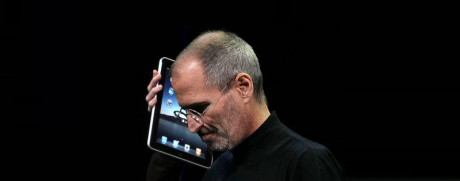Did the iPhone inadvertently overshadow the iPad?

Only yesterday did Apple release the latest offering of it's iOS for iPad, iPod touch and iPhone to version 4.2 which includes a number of student-useful features like AirPrint, the driver-less printing feature to rival Google's cloud print application.
iPhone owners rejoice. Though, for iPad users it would be unwise to suggest, even for a second, that the iPad is more successful than the iPhone. The iPad in comparison to it's its older sibling has been a flop.
Considering there has been four generations of iPhone and only one iPad revision to date, but numerous iOS updates since its release, the iPad has notably suffered to the iPhone. Apple sold an estimated 7.5 million devices worldwide from release to present day, dwarfing the best contender the Galaxy Tab, while iPhone sales contributed most to Apple's profits selling over 14 million devices this year.

The buzz was pretty big when the iPad was announced. Just as the iPhone was the "ultimate" phone, the iPad was the tablet to kill all other tablets. I don't know a single other device which has even come close to surpassing the iPad in sales, but one usually attributes that to having the might and weight of Apple behind it.
Now don't get me wrong; both the iPhone and iPad are impressive devices, even amidst of the Anntennagate 'scandal' which frankly amounted to nothing of actual fruition, more rather media hype leading to unnecessarily concerned consumers.
But I can think of three reasons why the iPad has not fulfilled the potential of its older yet smaller sibling:
The iPhone is smaller, handheld and pocket-sized
You must admit, it is far easier slipping an iPhone into your pocket than carrying an extra bag around with you to transport your iPad across town. The size of the device makes things awkward: are you are meant to handle it with both hands, or hold it with one and tap with the other? Maybe there are no right or wrong answers, but it is on the weighty side to hold with one hand.The 'Apple tablet' was the iPhone, not the iPad
The iPad is roughly three and a bit times bigger than the iPod touch and the iPhone, in terms of physical size and screen resolution; give or take. While I do not see the iPhone as a tablet per se, it probably is actually, albeit just a touch smaller than you would consider an acceptable size for one.Had Apple brought out the iPad earlier, then I strongly suspect that both the iPad and the iPhone would have both taken off respectively. Logically, a larger device comes first and then a smaller version of the original; the MacBook then the MacBook Air, the iPod then the iPod shuffle, and even the bog-standard notebook to the netbook.
But in that likelihood, the iPad would have been hugely popular, and the hypothetically "much awaited smaller iPad", the iPhone as it is today would have been even bigger.
Logic in hypothesis in this case appeals to me as louder than the timeline of Apple's tablet-like products.
Justifying the upgrade to a larger iPod touch
I know half of the iPad models have 3G access, but 3G coverage in the US is patchy at best and only really available to the major cities. But the iPhone is designed as a phone, where 3G makes little difference in comparison to that of the speeds of your data connection when you're browsing the web.Really, what is the point of having a larger iPod touch? To watch movies or to browse with a larger screen? Instead, buy a media extender so everyone else can watch on that 32" plasma in the corner, or take your existing laptop and go somewhere a bit quieter. After all, you have to sit at a jaunty knees-up position on a soft, sofa-like surface as all the advertising images show anyway.
If you have a non-3G iPad or iPod touch, it is pretty much expected of you to use it as a 'stock up then go' device. You turn on Wi-Fi, go to a place where you can access wireless Internet, and then download everything you want so you don't have to connect again for a while. Simple enough.
What do you think? Had the iPad come first, and then the iPhone, would both iOS devices be as popular as the iPhone is today?